- Home
- Robin LaFevers
Dark Triumph (His Fair Assassin #2) Page 5
Dark Triumph (His Fair Assassin #2) Read online
Page 5
I was so startled by the kiss, so taken aback and affronted at this violation of my person, that I retaliated in the only way I knew how: I kissed him back. I didn’t simply return the kiss while his lips were already planted on my own. Instead, I waited until he was busy polishing our lord father’s armor, sauntered up to him as I had seen Marie the upstairs maid do to one of the men-at-arms, grabbed his smooth cheeks in my hands, and smacked him soundly on his lips.
The scar that adorns his left eyebrow is from where I whacked him with our father’s scabbard when he tried to force a second kiss.
But while I rarely have occasion to feel grateful to Pierre, today I do. If Pierre is courting Vienne’s wife, any suspicion over her husband’s death will fall on their shoulders rather than mine.
I turn to Julian with a sly smile. “How long will it take Baron Vienne to realize that Pierre is cuckolding him?”
Julian smiles back. “Not long, for Pierre will not truly enjoy himself until he can rub the baron’s nose in it.”
Since we are speaking of the baron, I allow my gaze to drift over to him and Julliers. I can feel the rapid beating of their hearts—as if two horses are galloping far in the distance, just beyond true hearing. Beads of sweat have begun to form on Julliers’s brow, but Vienne shows no signs of distress. He is heavier than Julliers and so will no doubt need to absorb more poison before his symptoms begin in earnest.
Before either Julian or I can say anything further, the huntsman sounds his horn. It is time to hunt.
I remove my falcon’s hood, and she fluffs her wings in readiness, her sharp, keen eye scanning the field. I launch her from my arm, painfully jealous of her freedom as she rises high in the sky, wheeling around once, twice, watching for her prey.
But I have prey of my own. Both the barons have grown ashen, and Julliers’s left arm hangs useless at his side. If he is experiencing numbness in his limbs, it will not be long now.
Then the huntsman sounds his horn again, and the hounds are off the leash, the teaming swarm of them racing toward the underbrush to flush out the game. A frantic thudding of wings follows as the startled partridge take flight.
Like heavy stones thrown from a trebuchet, the falcons drop from the sky and plummet toward their prey. A series of soft thumps follow.
But one falcon—mine—is still moving; a lone rabbit has also been flushed from the brush. The poor creature’s death squeal is harsh in the quiet of the forest, and every nerve in my body flares, for the noise made by a dying rabbit is shockingly similar to that produced by a dying man. As the falcon returns, I thrust out my arm and hold my breath, waiting to see whose wrist she will return to. When she lands on mine, I decide to take it as a fortuitous omen.
I glance once more at the two barons and wonder yet again why Mortain has marqued them for death but not d’Albret. Their sins and betrayals are small when weighed against his.
It would have me questioning Mortain’s very existence if I did not so desperately need to believe in Him, for if He is not my father, then d’Albret is, and that I could not bear.
Flushed with the pleasure of our morning’s hunt, we head back to the castle. Julliers has given his hawk to his groom to carry, and Vienne slumps drunkenly in his saddle. While I am glad that the poison is working, I feel a tinge of regret at not being able to use my knives. They offer a much quicker and cleaner end, and I have no appetite for the lingering deaths of soft, pampered barons.
Everyone is happy with the morning, except Jamette, whose little goshawk caught nothing but a vole. “It is a good thing we do not have to eat only what we catch,” I tease her.
She glares at me, which makes me laugh out loud.
We are nearly to the city walls when I feel something watching me. It is not Julian, for Jamette is busy trying to draw him into conversation. Nor is it Pierre, who has taken full advantage of Vienne’s poor health and is practically making love to his wife in plain sight of us all. I glance over my shoulder, but there is no one there.
I turn back in my saddle. Are the French troops close enough that they could have scouts nearby? Or did some of the Rennes garrison stay behind to keep an eye on d’Albret’s movements?
Or perhaps it is no living thing I sense but the soul of one of those men who died so violently on the battlefield.
I glance over my shoulder once more. When I do, a crow flutters from a far tree to a closer one. His left wing is crooked, as if it had once been broken.
Merde.
I whip back around in my saddle. It is my very own crow. The one Sister Widona had rescued and kept in a cage when I first arrived. She used the frightened, wounded creature to draw me out of the morass my own mind had fallen into. Without that crow, I might be there still.
The convent has sent me a message. It has been four long months since I last heard from them, and I had nearly given up hope that I ever would again. But now. Now there is a message. My spirits soar just like the falcons did moments ago. Perhaps old Sister Vereda has Seen what I could not—d’Albret’s death.
“You seem restless.” Julian’s voice yanks my mind from its daydreaming. The crow’s timing could not be worse.
“Not at all,” I say.
Ever jealous of the attention Julian pays me, Jamette sticks her long nose in. “Why is that crow following you?” she asks.
“You are deluded,” I scoff. “He is not following me. I think he is after the vole you caught.”
“No, no,” she says, and my hand itches to slap her silly face. “It is following you. Look!”
The crow flutters another tree closer.
“Tsk. Does not the lowly crow realize he is far beneath my sister’s notice? Here.” Julian moves his hand toward his falcon’s jesses. “I will dispatch the uncouth creature for you.”
“No!” I say, too sharply.
He cocks an eyebrow at me, and I give him a cool smile. “What am I to do with a crow? Put it in a pie with Jamette’s vole? Besides,” I add in a bored voice, “it is wounded, or deranged. No healthy crow would hover this close to falcons. And see how it holds its wing? Leave it be. Or,” I say, smiling in open challenge, “better yet, do try to catch it. That way I can beat you back to the castle.”
With that challenge thrown down, I put my heels to my horse and fly forward. A split second later, the others follow.
I even let Julian win.
When we reach the castle, I hand my falcon to the waiting groom, then dismount. My gaze scans the horizon for the crow, half fearing he will land on my shoulder in front of everyone. I must think of a way to get the message without half the castle seeing.
Jamette lingers near the stable, still trying to flirt with Julian, and Tephanie is nowhere to be seen. Perhaps I can steal a few moments in my room alone and coax the wretched creature to the window long enough to remove the message he carries. Leaving the others to their own amusements, I quit the courtyard and enter the palace, then head for the stairs.
No one follows. My luck holds, and when I reach my chamber, it is empty. I head straight for the window and open the casement—but there is no sign of the crow. I wait a few more moments, willing him to find me, then huff out a sigh of frustration. Just as I am about to close the window, I hear a caw and see a flap of black wings. But too late. I can hear Jamette and Tephanie at the chamber door. I slam the window shut and close the thick velvet curtains.
“What are you doing?” Jamette asks as she comes into the room. “Now it is too dark in here.”
I put my hand to my temple. “I have a headache,” I say crossly.
A look of genuine concern appears on Tephanie’s round face as she hurries over to my side. “Shall I fetch a tisane? Or lavender water?”
I could send them to fetch a tisane or hot wine, but that requires only one of them. Besides, Jamette will just linger in the hallway with her large ear stuck to the wall.
“You were fine but moments ago,” she points out.
I spear Jamette with a vicious look. “Was I really
, Jamette? Were you paying close enough attention to know that?”
She flushes at this reminder of just how poorly she has attended me. Then I make a decision. “I am going outside.”
Jamette gapes at me. “But you have a headache!”
“Indeed I do. I believe it is your screeching voice and the vile perfume you favor, which is why I need fresh air.”
Her mouth closes with a snap, and I feel the smallest tweak of conscience, for her scent is fine. And then I remember that she reports every move of mine to my father, and my regret evaporates.
Outside, the day has grown blustery, the wind proving that February is indeed the whirling month. Just like the leaves and twigs that dance in eddies across the courtyard, hope dances deep inside me. Perhaps d’Albret is marqued in such a way that I cannot see it but Sister Vereda with her seeress skills can. The thought of finally being able to move against him fills me with a dark joy. If I am at last able to kill him, the duchess and kingdom will be safe from his grasping ambition and brutal ways. Perhaps I can even arrange for my sisters to come finish their schooling at the convent. Not to train them in the killing arts, but because most of what the nuns teach us is much like the education that any noblewoman receives. Then my sisters would be safe even from Pierre and Julian. Although I do not think Julian would ever hurt them. At least not intentionally.
The gardens are deserted, since no one else is fool enough to venture out to this raw, barren spot. I take a slow breath and revel in the solitude. I am forever attended by someone—my ladies in waiting, my brothers, the various hangers-on of my father’s court—and I crave solitude. That and freedom. I glance overhead and try to recapture that soaring feeling I had when my falcon launched from my wrist, but I cannot.
Instead, an irritable caw brings me back to earth as Monsieur Crow lands on a branch before me, then cocks his head, as if wondering why I have taken so long.
“You’re a fine one to talk,” I scold him, but he knows I do not mean it and hops close. As I move toward the branch, I see that the note is wrapped tightly around his ankle and covered with black wax so that someone would have to be very close in order to see he bore a message.
I slip my knife from its sheath, and the bird gives a caw of objection. “I have no other way to get it off, you silly creature.” A quick snip and a slice, then wax crumbles and I am able to unwind the note from his leg. As I shove it into the knife sheath at my wrist, the crow looks to me for a reward. “I have nothing for you today—I am sorry. Now go. Quickly! Before you get us both killed.” I flap my hands at him and he hops but one bush away. “Hsst!” I say, and with a caw of reproach, he launches into the sky and disappears over the castle wall.
“Talking to the crows, my lady?”
Bertrand de Lur’s deep voice nearly causes me to jump. Instead, I use the startled movement to swing gracefully around and face him.
“That will earn you a reputation of witchcraft,” he says.
I tilt my head and smile mockingly at him. “Do they not say that already?”
He inclines his head, conceding the point. “Even so, it is not safe for you to be out here alone, my lady.” While his voice is rich and cultivated, there is something about the way he says my lady that makes the words feel like a slur. Or perhaps it just seems that way because his lust is so thick it reaches out and enfolds me like a mantle. How long has he felt this way?
“Where are your attendants?” he asks, his voice hard.
Even though I do not care for Jamette, I cannot surrender her to the threat I see lurking in his eyes. “I ordered them from my side. I have a headache and wanted fresh air.”
He glances around at the secluded section of garden, his eyes missing nothing. “I would think my lady’s beauty would attract a nightingale or a linnet, not a bedraggled crow.” He steps closer then, and for the first time I grow wary. Does he think me such damaged goods that he can take liberties without fear of reprisal from my father?
“It is not safe to be alone out here, not with all the men-at-arms we have posted. Any one of them might come upon you and be moved to take advantage of your unattended solitude.” He takes another step toward me.
Because I want to back away from him, I force myself to move forward until there is but a handbreadth between us. I gaze steadily into eyes. “Do you really think any of the men would be so foolish as to risk my father’s wrath in such a way? Surely they would not wish to see their guts strung up from the castle walls?”
There is a long moment of silence, then finally he nods. “Your point is well taken, my lady. Come, I am to escort you to your lord father.”
A cold trickle of fear slides into my belly. “Did my lord father say what he wished of me?” I hate myself for asking, for it shows my weakness, but I cannot help it. It is never wise to wander into d’Albret’s lair unprepared.
“He did not share his purpose with me, no.”
But he knows. I can see that knowledge in his eyes, and he looks for all the world as if he is gloating. I remember the convent’s order concealed in my sheath and permit myself a small secret smile as he takes my arm and we begin walking back to the palace.
The trip to d’Albret’s chambers lasts forever and puts me in mind of how a man approaching the gallows must feel. How long was de Lur watching me before he made his presence known? Did it appear to him as if I was just shooing away a crow, or feeding it, mayhap? Or did he see me take the message from the creature’s leg?
And what of d’Albret? Has he found some reason to tie me to the duchess’s escape? I was so careful. So very, very careful. I must continue to do everything in my power to assure him that I am committed to his cause so that he does not have his guard up when I am at last able to act. To force my mind away from its ceaseless worry, I anticipate all the ways I could kill d’Albret. It would be so satisfying to choke the life from him with a garrote around his fat neck. Or fillet his big white belly like a fish. But there is danger in those methods, for they require I get close to him, and he has uncanny strength and could possibly overpower me. Poison or a crossbow would be safest.
Too soon, we reach our destination, and Captain de Lur announces my arrival. Holding my head high and willing my heart to stop its wild, erratic beating, I step into the room.
Chapter Six
SUCH IS THE FORCE OF d’Albret’s presence that he’s managed to taint even the rich opulence of Duke Francis’s elegant palace. Everything, from the frescoes on the walls to the carved stag heads bursting from the overmantels, looks morbid and faintly threatening.
I sink into a deep curtsy. “My lord father, how may I serve you?” Because showing too much humility and blind obedience would ring false, I raise my eyes and allow them to fill with just a hint of mockery as they meet his cold, flat gaze.
“My prodigal daughter has deigned to pay me a visit. Where was she?” d’Albret asks the captain, his eyes never leaving mine.
“In the garden, talking to a crow.”
D’Albret arches one heavy black eyebrow, and I shrug as if mildly embarrassed. “My time at the convent of Saint Brigantia has given me an appreciation for wild things, my lord.” For that is the lie the abbess and I concocted to explain my long absence from d’Albret’s household: that I had retreated to the sisters of Brigantia for healing and training.
D’Albret snorts in disgust. “They have made you soft.” He turns to one of the guards at the door. “Go see if you can find this crow and catch it. Perhaps I will feed it to her for her supper.” A faint flutter of dismay moves in my breast, but hopefully the foolish bird will be long gone by now. If I am forced to eat my crow, of a surety I will spew it back up, and I will be certain to do so on d’Albret’s fine cordwain boots. The thought of that gives me some small measure of courage, and I am able to meet his gaze with true amusement in my own.
The guard bows once, then departs. “Search her,” d’Albret orders de Lur.
The captain glances uncertainly at d’Albret. At the count’s nod,
de Lur slowly smiles, then moves to stand in front of me. The smirking pig puts his hands on my shoulders and then draws them down my arms, feeling every inch of my skin beneath the fabric of my sleeves.
I refuse to give him the satisfaction of shuddering at his touch. Instead, I amuse myself by wondering if de Lur will try to stop me from fulfilling the convent’s order to kill d’Albret. If he does, I may have to kill him as well.
When his hand connects with the sheath strapped to my left wrist, his eyebrows shoot up in surprise. “What is this?”
“’Tis but my knife, my lord. You would not expect a d’Albret to wander about unarmed?”
He starts to peel back my sleeve. “Careful,” I warn him. “The edge is most sharp.”
That gives him a moment’s pause. While he is still trying to decide if I have threatened him, I reach for my knife. As my fingers close around the handle, I carefully slip the tiny, rolled note against my palm before unsheathing the blade.
He glances warily at the sharp edge, then stuffs two fingers into the leather sheath at my wrist and begins poking around. I cast an annoyed look at d’Albret. “Is it seemly for him to enjoy it this much?”
“I told you to search her, not make love to her,” d’Albret says. “How would you like it if I did such to your daughter, eh?” The threat is unmistakable, and de Lur’s movements become much more circumspect.
However, when he reaches my buttocks, he cannot resist giving my cheeks a faint pinch. That is when I realize I am still holding my knife, and it is all I can do not to plunge it into his gut. Instead, I move my hand as if to return the knife to its sheath, but I do not pull the blade back quite far enough. The point of it rakes across his cheek.
He swears and shoves me away as he puts his hand to his face.
“I did warn you that it was sharp.”
His nostrils flare in fury, and he glances at d’Albret. “She carries nothing,” he says, “but a small dagger and an even smaller heart.”

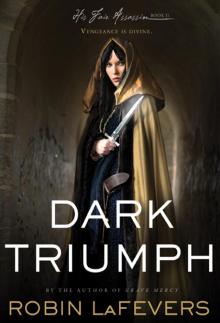 Dark Triumph
Dark Triumph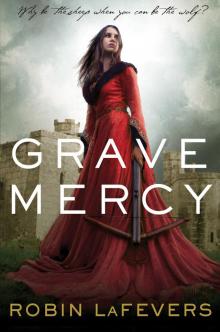 Grave Mercy
Grave Mercy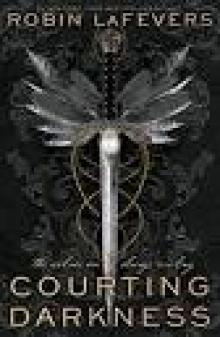 Courting Darkness
Courting Darkness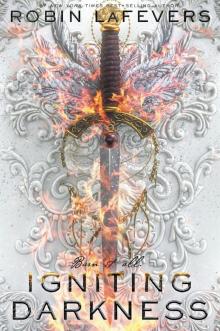 Igniting Darkness
Igniting Darkness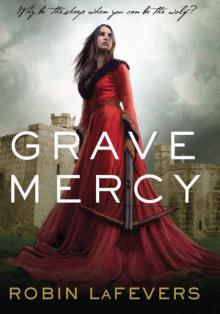 Grave Mercy (Book I) (His Fair Assassin Trilogy)
Grave Mercy (Book I) (His Fair Assassin Trilogy)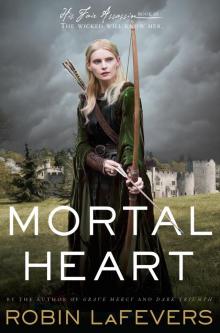 Mortal Heart
Mortal Heart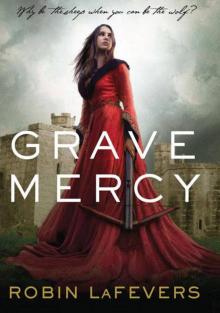 Grave Mercy (Book I): His Fair Assassin, Book I (His Fair Assassin Trilogy)
Grave Mercy (Book I): His Fair Assassin, Book I (His Fair Assassin Trilogy)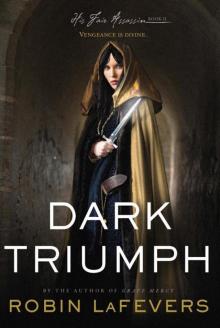 Dark Triumph (His Fair Assassin #2)
Dark Triumph (His Fair Assassin #2)